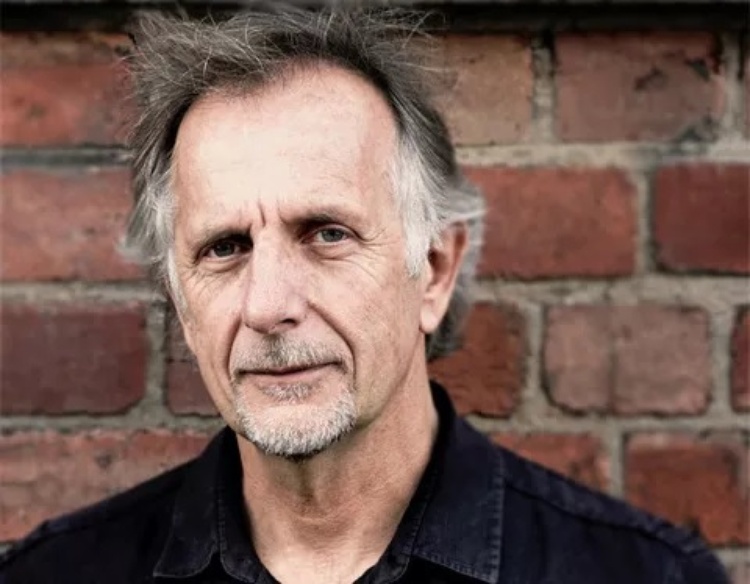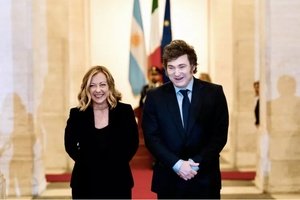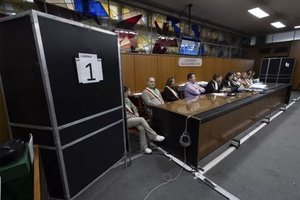“It’s certainly a great honour, especially considering my roots and my family’s migration story, and it’s a wonderful recognition of my career,” he says.
“But for me, it’s particularly important that the award reflects my commitment to promoting the rights of Australian writers and the battle I have waged for 40 years to increase the proportion of Australian productions in film and television.”
A member of the Australian Writers’ Guild for decades, of which he was also president from 2011 to 2018, the writer of Elban origins has always been at the forefront in the fight against the supremacy of American content on our screens.
“It costs much less to buy ready-made foreign productions than to invest in Australian stories,” he says.
“But this prevents the emergence of a national voice, which is current and which reflects the voices of our multicultural society.
“It’s imperative that future generations know how Australia came to be the country we know today.
“And the only way to do it is through its stories.”
Sardi grew up listening to stories from his grandparents – all four of whom hailed from Capoliveri, on the Island of Elba – as well as those of people he encountered in every corner of Carlton, which replicated an Italian village back in the 1950s and ‘60s.
“You just had to walk along Lygon Street, when there were still very few cars, to get that feeling of living in a particular microcosm,” he recounts.
“The street was dotted with Italian shops: the bar, the restaurant, the delicatessen and the barber.
“We had guests for dinner at our house, at least three or four times a week.
“There was always someone who told stories of a perhaps mythologised Italy.
“But I’m sure my passion for stories was sparked partly by those dinners.”
The Sardi household was a point of reference in Carlton, especially for new arrivals in search of work.
Jan’s father, Gualberto, was the manager of Mario Viganò’s historic Mario’s restaurant on Exhibition Street, where many Italian chefs learnt the ropes before starting their own successful businesses.
“Mario’s was a real institution in those years, and its Sunday shows attracted many famous people passing through Melbourne, such as Ava Gardner, Frank Sinatra, Gregory Peck and Claudio Villa,” Sardi says.
Gualberto started working at Mario’s at the age of 13, to help his family get by.
His father, Manlio, migrated from Capoliveri in 1927 and initially settled in Queensland, working on the sugar cane plantations.
Joined by his family after eight long years, he then decided to try his luck in Melbourne.
Meanwhile, Jan’s maternal grandparents, Luigi and Norma Donnini, opened a grocery and bakery on Lygon Street in the 1930s, supplying produce to all the restaurants in the area.
That was how Gualberto met his future wife, Diva.
The two married in 1948 and had two sons: Jan and Peter.
“My brother and I spent our childhood with our grandparents because our parents both worked a lot,” Sardi says.
“My brother didn’t know a word of English when he started kindergarten.
“Our grandparents spoke only Italian until the day they died.”
Also on the school benches of St Joseph’s College, in North Fitzroy, there was a solid representation of the Italian community.
When Sardi returned to the school as a teacher in the mid-1970s, the explosion of multiculturalism he encountered inspired his first screenplay.
Released in 1982, Moving Out follows the story of an Italo-Australian boy during his last two weeks of school.
The main character is played by a very young Vince Colosimo in his first role as an actor.
“It wasn’t a reflection of my personal experience so much as the result of what I observed on a daily basis as a teacher: conversations with students, or exchanges between them that I happened to witness,” Sardi says.
“Also because in the meantime, the children of Greek, Lebanese and Turkish immigrants had joined the students of Italian heritage; it had become a 100 per cent multicultural school.
“Furthermore, my parents had grown up in Australia, while for these children the cultural gap between family and the outside world was more marked.
“Once, during a conversation between parents and teachers, a student acted as the interpreter for his father who didn’t understand English and invented a whole different story in order to avoid translating the teacher’s disappointment in him.”
Having gained experience with Moving Out and other screenplays for cinema and television, Sardi soon abandoned his teaching career to devote himself to writing full time.
Sardi’s big moment came in the 1990s, when his friend and director, Scott Hicks, gave him the arduous task of translating the inner world of an artist in the balance between genius and madness for cinema, and telling the extraordinary story of Australian pianist David Helfgott in the 1996 film, Shine.
In 1997, Sardi was nominated for an Academy Award for Best Writing (Original Screenplay), for Shine.
“Scott had seen David Helfgott play live before he became famous,” Sardi explains.
“He was just getting back on top after a long series of nervous breakdowns.
“He gave me a very short recording in his voice: there were only three or four minutes of conversation in which, however, I found the interpretative key to try to get into his head.
“Then I spent a few days myself in the company of David, and found in his relationship with his father the common thread that I was looking for.”
Sardi wrote and directed the 2004 film Love’s Brother, based on the many stories and adventures of migration that he’d heard at the kitchen table growing up.
“It was just as I was collecting testimonies for the film that I began to fully appreciate the cultural wealth which I grew up in and trace its legacy in wider Australian culture,” he explains.
“These people left their homeland to build something for their children, but they ended up building something for Australia.
“I wanted to tell the arrival of the first coffee machines in Melbourne’s bars, but I needed a story to develop.”
Sardi decided to spend some time in Queensland for research, where he learned the story of a man who’d sent a photo of his brother to a potential wife in Italy, because he was more attractive, without worrying about what would happen with his future bride.
He also found that this kind of subterfuge was common during the 1950s, when the ratio of men to women of Italian origin was five to one.
After his experience behind the camera, Sardi went back to just writing, with Mao’s Last Dancer (2009) and the television mini-series The Secret River (2015).
Today, he’s working on a new project which he can’t yet reveal too many details about, apart from that it’s a collaboration with Robert Connolly, the director of Balibo and Paper Planes.
“We hope to be able to film it next year, and that all the upheavals due to the coronavirus have passed,” Sardi concludes.
“Meanwhile, I’m taking advantage of the forced isolation to devote myself to writing.
“But the thing I love the most about making a film is collaborating with the director during filming... I can’t wait!”












